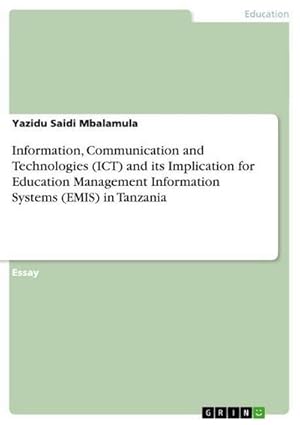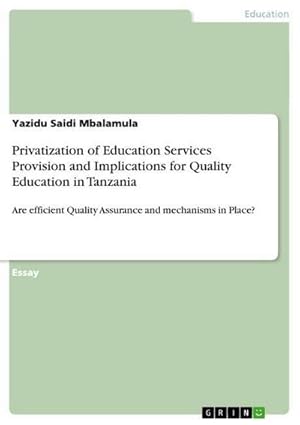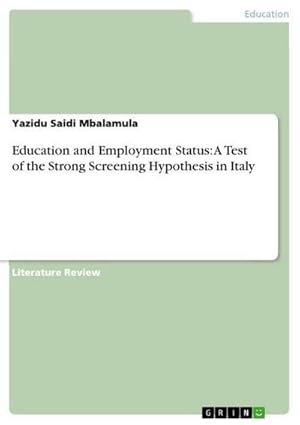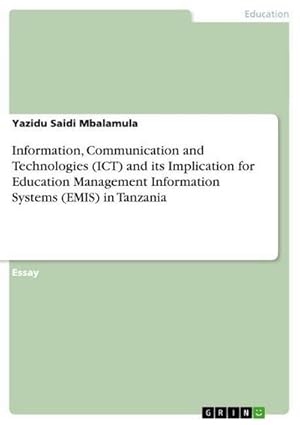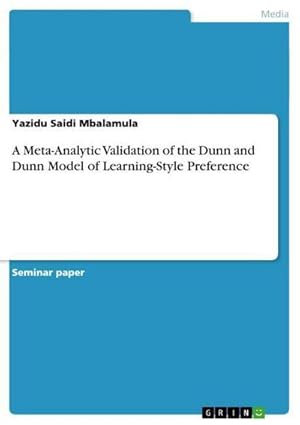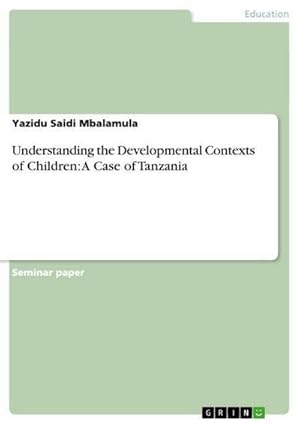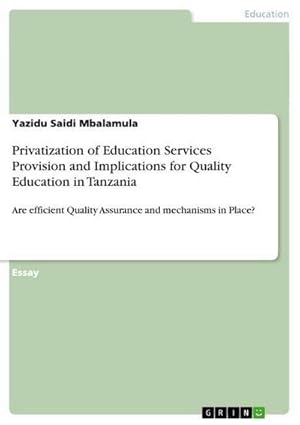yazidu saidi mbalamula (7 résultats)
Type d'article
- Tous les types de produits
- Livres (7)
- Magazines & Périodiques
- Bandes dessinées
- Partitions de musique
- Art, Affiches et Gravures
- Photographies
- Cartes
- Manuscrits & Papiers anciens
Etat
Reliure
- Toutes
- Couverture rigide
- Couverture souple (7)
Particularités
- Ed. originale
- Signé
- Jaquette
- Avec images (7)
- Sans impressions à la demande (5)
Livraison gratuite
- Frais de port gratuits USA
Pays
Evaluation du vendeur
-
Information, Communication and Technologies (ICT) and its Implication for Education Management Information Systems (EMIS) in Tanzania
Edité par GRIN Verlag Apr 2014, 2014
ISBN 10 : 3656635412ISBN 13 : 9783656635413
Vendeur : BuchWeltWeit Ludwig Meier e.K., Bergisch Gladbach, Allemagne
Livre impression à la demande
Taschenbuch. Etat : Neu. This item is printed on demand - it takes 3-4 days longer - Neuware -Essay from the year 2014 in the subject Pedagogy - School System, Educational and School Politics, grade: 7.5, University of Dodoma (College of Education), course: Educational Management and Administration, language: English, abstract: Education Management Information System (EMIS) is essential to empower planning process to translate educational policy into actions. The application of Information, Communication and Technology (ICT) in Educational settings is equally important for developing economies such as that of Tanzania to pursue two mutually reinforcing stimulation of socioeconomic and global agenda of economy prosperity goals. There is close link between ICT and EMIS, and the efficiency and effectiveness of latter is considerably affected by the former. It is in this contention that as per analysis made in this paper which reveals that ICT is still suffering from serious shortcomings, which unless solved, EMIS will continue to be ineffective and inefficient strategy. Three major problems identified in the paper include the (i) lack of infrastructure and systems in place to facilitate effective monitoring as a result utilization of ICTs in Tanzanian education institutions are dismal due to low connectivity and teledensity (ii) insufficient numbers of qualified technical personnel to manage and maintain ICT resources, (iii) inadequate training and capacity development resulting in underutilization of ICT facilities. This paper provides a basic and general review of how ICT influences and hampers EMIS effectiveness and efficiency. Also recommendations are provided at the end on how to improvise EMIS in order to maintain quality information in various educational processes. 16 pp. Englisch.
-
Privatization of Education Services Provision and Implications for Quality Education in Tanzania
Edité par GRIN Verlag Apr 2014, 2014
ISBN 10 : 3656635390ISBN 13 : 9783656635390
Vendeur : BuchWeltWeit Ludwig Meier e.K., Bergisch Gladbach, Allemagne
Livre impression à la demande
Taschenbuch. Etat : Neu. This item is printed on demand - it takes 3-4 days longer - Neuware -Essay from the year 2014 in the subject Pedagogy - School System, Educational and School Politics, grade: 8, University of Dodoma (College of Education), course: Educational Management and Administration, language: English, abstract: Privatization of education service and delivery aimed to enhance access and improve quality of education. This shift emanated from global influence such as that of Washington Consensus and Structural Adjustment policies. Notwithstanding there have been quantifiable benefits from this privatization policy, nevertheless, privatization of education services is doomed to assume more commercial and market orientations which undermines quality of education across countries. Evidently, the private education providers, inter alia are largely influenced by profit-making realization in order to nurse their recurrent operational costs, the market dynamics and clientele satisfaction. With few and inefficient quality assurance and controls mechanism in place, as in case of developing countries, and Tanzania in particular, there is less to expect of any good for the quality of educational product at the end of the term in any educational life span. whilst the question whether privatization is or is not feasible approach to sustain emerges, and whose effects which may be presumably intolerable to other production endeavors in which there is room for remedy; educational services suffer total and irreversible defect. This paper confines to anecdote pertinent question, 'are there efficient quality control assurance and quality control mechanisms for education services and delivery '. This is fundamental question in order to analyze effectiveness of Privatization of Education Approach in Tanzania. Moreover, several aspects will be discussed including Effectiveness Inspectorate Boards, Examination and Accreditation boards. 24 pp. Englisch.
-
Education and Employment Status: A Test of the Strong Screening Hypothesis in Italy
Edité par GRIN Verlag, 2014
ISBN 10 : 3656635498ISBN 13 : 9783656635499
Vendeur : Smartbuy, Einbeck, Allemagne
Livre
Taschenbuch. Etat : Neu. Druck auf Anfrage Neuware - Printed after ordering - Literature Review from the year 2014 in the subject Pedagogy - Miscellaneous Topics, grade: 9.0, University of Dodoma (College of Education), course: Research Methods and Statistical Analysis, language: English, abstract: The study presented in the article was comparatively intended to investigate the relationship of two key independent variables, Education level (i.e. low, intermediate, high and degree) as related to Employment status (i.e. public, private of self employment) on individual earnings. The Human Capital Theory is adopted to contextualize theoretical base of the relationship between the variables. The theory is further inclined to two strands of Screening hypothesis, Strong Screening Hypothesis (SSH) and Weak Screening Hypothesis (WSH) which in respect contrast, SSH presumes productivity is immutable with schooling used exclusively as a signal, while WSH concedes that not only that primary role of education is to signal, but also it augments inherent productivity. The two opposing theses expand the possibilities beyond Human Capital theorizations. The study collected data from sample of 1169 individuals (853 employed and 316 self-employed) as derived from Banca d'Italia survey data of 1989 and questionnaires. Two sample selection methods were adopted from Wolpin (1977) and Psacharopoulos (1979), and Bivariate and Multivariate selection methods were employed to control bias on the two resulting dependent variable categories, that is, all employees and self-employed category; and private, public and self employed category. In the same vein, the authors adopted Heckman (1979) bivariate and Lee (1983) sample selection approaches. 12 pp. Englisch.
-
Information, Communication and Technologies (ICT) and its Implication for Education Management Information Systems (EMIS) in Tanzania
Edité par GRIN Verlag, 2014
ISBN 10 : 3656635412ISBN 13 : 9783656635413
Vendeur : AHA-BUCH GmbH, Einbeck, Allemagne
Livre
Taschenbuch. Etat : Neu. Druck auf Anfrage Neuware - Printed after ordering - Essay from the year 2014 in the subject Pedagogy - School System, Educational and School Politics, grade: 7.5, University of Dodoma (College of Education), course: Educational Management and Administration, language: English, abstract: Education Management Information System (EMIS) is essential to empower planning process to translate educational policy into actions. The application of Information, Communication and Technology (ICT) in Educational settings is equally important for developing economies such as that of Tanzania to pursue two mutually reinforcing stimulation of socioeconomic and global agenda of economy prosperity goals. There is close link between ICT and EMIS, and the efficiency and effectiveness of latter is considerably affected by the former. It is in this contention that as per analysis made in this paper which reveals that ICT is still suffering from serious shortcomings, which unless solved, EMIS will continue to be ineffective and inefficient strategy. Three major problems identified in the paper include the (i) lack of infrastructure and systems in place to facilitate effective monitoring as a result utilization of ICTs in Tanzanian education institutions are dismal due to low connectivity and teledensity (ii) insufficient numbers of qualified technical personnel to manage and maintain ICT resources, (iii) inadequate training and capacity development resulting in underutilization of ICT facilities. This paper provides a basic and general review of how ICT influences and hampers EMIS effectiveness and efficiency. Also recommendations are provided at the end on how to improvise EMIS in order to maintain quality information in various educational processes.
-
A Meta-Analytic Validation of the Dunn and Dunn Model of Learning-Style Preference
Edité par GRIN Verlag, 2014
ISBN 10 : 3656635420ISBN 13 : 9783656635420
Vendeur : AHA-BUCH GmbH, Einbeck, Allemagne
Livre
Taschenbuch. Etat : Neu. Druck auf Anfrage Neuware - Printed after ordering - Seminar paper from the year 2014 in the subject Communications - Research, Studies, Enquiries, grade: 9.0, University of Dodoma (College of Education), course: Research Methods and Statistical Analysis, language: English, abstract: The intrinsic nature of learning process where a learner manifests changes in behavior as result of experience has provoked serial debates in Education Research. The discussions range from 'what', 'when', 'how' and 'where' would a learner be able to perform; which not only view a learner as subject of knowledge but also an ultimate object for knowledge generation. The differences in performance among learners are evident and require an extensive investigation to improve and maintain. However, the fundamental question remains as to 'why' students' performance is different; this is a crucial starting point to understand the different ways 'style' which a learner use in the daily learning processs (Brown, 1994; Sorenson, 2011).In this article, the study sought to analyze the hypothesis that 'accommodating students' learning-style preferences increase academic achievement'. The study analysis delimits to understanding of how various factors influence how students learn and their consequential effect on academic achievement. The study extarcted research studies through computer-based survey; fourty two studies out of 138 were rated by Lytton and Romney's rating scales, then 6 of 42 were discarded following inherent validity threat. The sample of 3181 from 36 studies was thereafter subjected to meta-analysis.Through Meta-analysis cummulative effect size r of .353 was calculated with residual variance of 0.79, the latter converted to Mean Standard Deviation (MSD) d of .755. The measures complemented to standard normal curve, revealing that the academic achievement of students will increase three fourths (3/4) when learning learning style are accommodated than those whose learning styles have not been accommodated.Generally the findings from the study established the fact that to ensure optimal academic achievement, it is inevitably necessary to understand and account (i.e. implication for instructional interventions) for the factors that best provide or compliment the students' affection and passion (style) to learning of particular subject (s).
-
Understanding the Developmental Contexts of Children: A Case of Tanzania
Edité par GRIN Verlag, 2014
ISBN 10 : 3656635536ISBN 13 : 9783656635536
Vendeur : AHA-BUCH GmbH, Einbeck, Allemagne
Livre
Taschenbuch. Etat : Neu. Druck auf Anfrage Neuware - Printed after ordering - Seminar paper from the year 2014 in the subject Pedagogy - Pedagogic Psychology, grade: 9.0, University of Dodoma (Collge of Education), course: Developmental Psychology, language: English, abstract: The term Context refers to connection, coherence in discourse, also, interrelated conditions in which something exist or occurs (Winegar and Valsiner, 1992). According to relational meta-model as propounded by Damon and Lerner (2008) human development can be understood by analysis of integral individual-context as he or she cohabit in respective level multiplicity of operating factors including family, school, traditions, media and legal system. Similarly, in the Tanzanian Constitution and the United Nations Convention for rights of children as dictated in Child Development Policy in Tanzania (URT, 1996) 'a child' is a person below eighteen years old and his/her development is a function of physical, intellectual, moral and spiritual growth (URT, 1996). The child development policy also shows that children make an important segment of the Tanzanian society constituting about 46% of the approximately 46 million population. Studies show that in order for a child to grow well, she/he needs to be cared for, given guidance, and brought up in accordance to norms of the community. Therefore, the gross conceptualization of children in any given time and space can best be understood by accounting respective contextual factors as will be discussed there-after in this paper. The discussion will provide a descriptive understanding of important issues for assuring and guaranteeing the well being of a child development.
-
Privatization of Education Services Provision and Implications for Quality Education in Tanzania : Are efficient Quality Assurance and mechanisms in Place?
Edité par GRIN Verlag, 2014
ISBN 10 : 3656635390ISBN 13 : 9783656635390
Vendeur : AHA-BUCH GmbH, Einbeck, Allemagne
Livre
Taschenbuch. Etat : Neu. Druck auf Anfrage Neuware - Printed after ordering - Essay from the year 2014 in the subject Pedagogy - School System, Educational and School Politics, grade: 8, University of Dodoma (College of Education), course: Educational Management and Administration, language: English, abstract: Privatization of education service and delivery aimed to enhance access and improve quality of education. This shift emanated from global influence such as that of Washington Consensus and Structural Adjustment policies. Notwithstanding there have been quantifiable benefits from this privatization policy, nevertheless, privatization of education services is doomed to assume more commercial and market orientations which undermines quality of education across countries. Evidently, the private education providers, inter alia are largely influenced by profit-making realization in order to nurse their recurrent operational costs, the market dynamics and clientele satisfaction. With few and inefficient quality assurance and controls mechanism in place, as in case of developing countries, and Tanzania in particular, there is less to expect of any good for the quality of educational product at the end of the term in any educational life span. whilst the question whether privatization is or is not feasible approach to sustain emerges, and whose effects which may be presumably intolerable to other production endeavors in which there is room for remedy; educational services suffer total and irreversible defect. This paper confines to anecdote pertinent question, 'are there efficient quality control assurance and quality control mechanisms for education services and delivery '. This is fundamental question in order to analyze effectiveness of Privatization of Education Approach in Tanzania. Moreover, several aspects will be discussed including Effectiveness Inspectorate Boards, Examination and Accreditation boards.


